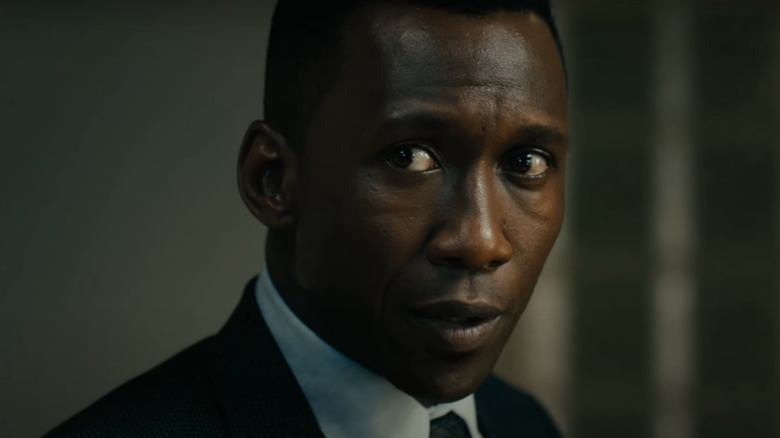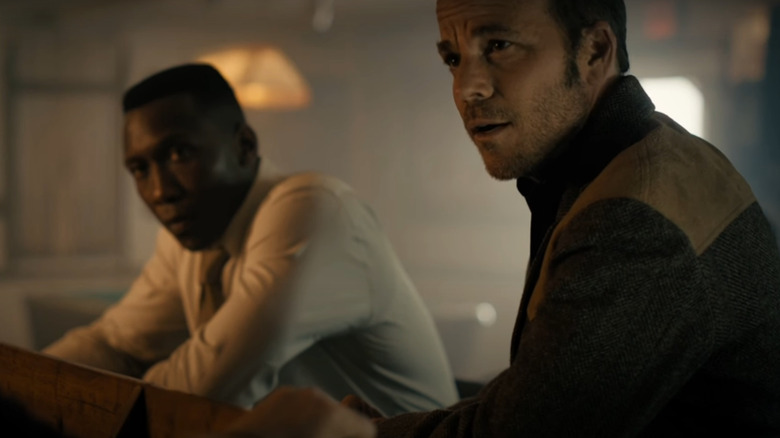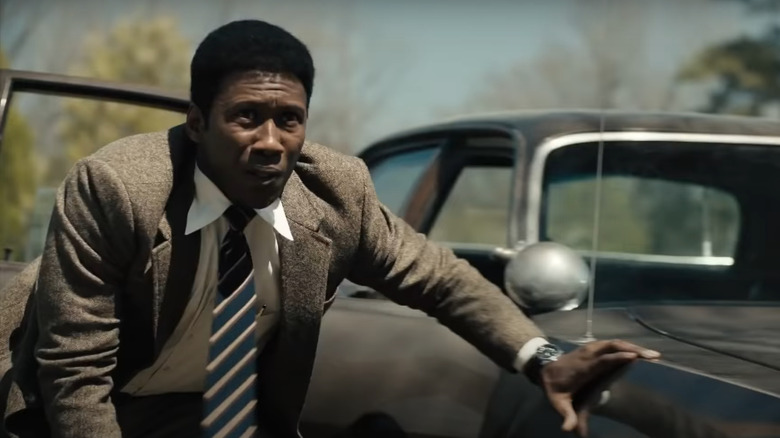Season 3 Changed How True Detective's Creator Approached The Show
It's not that surprising that the man behind "True Detective" and its intricately plotted mysteries is a bit of a control freak. Nic Pizzolatto helped usher in a new era of prestige TV with "True Detective" season 1, aided immensely by career-best performances from Woody Harrelson and Matthew McConaughey. Also helping to keep Pizzolatto's characteristically dense storytelling on the more lucid side was director Cary Fukunaga, who reportedly struggled with Pizzolatto. As the director claimed, the showrunner, "kept positioning himself as if he was my boss and I was like, 'But you're not my boss. We're partners. We collaborate.'"
When it came time for season 2, Pizzolatto wasn't having any more of that collaboration nonsense. He wrote the entire season (two episodes were co-written) and remained on set throughout production to keep a close eye on proceedings. As he told Indiewire: "In the first two seasons, if the cameras were rolling, I was never not on set." Unfortunately, it seems that didn't translate to more success, with many viewers considering season 2 a disappointment. Esquire summed things up by decrying the "strange combination of slick overproduction and basic incompetence," signaling that Pizzolatto's exercise in megalomania had, by most accounts, failed.
And so we come to "True Detective" season 3, a solid entry in the crime drama anthology that falls short of recapturing the first season's greatness. This time, Pizzolatto once again wrote the whole thing, aside from a couple of episodes which he co-wrote, but seemingly relaxed on the whole micromanaging approach he'd previously taken. Why? Because he basically gave himself a taste of what Fukunaga dealt with on season 1 and realized he'd been a bit of a jerk. At least, that's my way of putting it. As you'll see, Pizzolatto was a little easier on himself.
Learning to step back
When season 3 kicked off, Pizzolatto's attempts to recreate the first season's magic seemingly extended to his relationship with the show's director. Jeremy Saulnier left after two episodes citing scheduling conflicts, though Variety reported it was more about good old "differences of opinion" between him and Pizzolatto. Whatever the reason, the showrunner, who'd yet again written the entire season aside from two episodes, was left to run things solo, just as he'd seemingly wanted.
He dutifully took over directing duties for episodes four and five, before bringing in Daniel Sackheim to finish things up. And according to Indiewire, the show creator found directing to be a revelatory experience:
"This third season [...] especially with [director] Dan [Sackheim], I just started stepping back [...] I tried to give everybody space to work; to trust the process and trust the people we hired a bit more [...] I don't know that I've ever felt calmer during production than when I was directing."
Cutting out the middleman and sliding into the director's chair appeared to be truly enlightening for the fastidious Pizzolatto, who claimed that having a team of "100 people all around you who are dedicated to making your job easier" endeared him more to the collaborative approach. Ultimately, he claims to have learned that "stepping back is healthy. Everybody can have a clear idea of their jobs, and you can actually step back and have a life." Still, having repeatedly clashed with his directors in the past, he couldn't reflect on his experience without undermining the role of director generally: "I think it's a job with a lot of mystique around it that isn't necessarily always earned."
Pizzolatto the (almost) auteur
Having learned to "step back," Pizzolatto will be leaving the creative work to new showrunner Issa López for the show's fourth season. López will be writing and directing an Alaska-based mystery that will see a whole new creative team take on the crime anthology show. Which, considering season 3's failure to reach the heights of the first season, doesn't seem like all that bad an idea. Pizzolatto will have plenty of opportunities to tell his noir-ish tales elsewhere while still maintaining some minimal oversight on his detective show as an executive producer. Meanwhile, López will be free to bring her vision to life unimpeded.
All of which sounds great, but there's a small part of me that wishes Fukunaga and Pizzolatto could find a way to work together again. As the director explained to The Hollywood Reporter in 2021, from his perspective, Pizzolatto "is a really good writer, but I do think he needs to be edited down." Fukunaga saw it as his job to "take some of these long dialogue scenes and put some air into them," which, judging by the final result, was exactly what the showrunner needed.
Vanity Fair referred to Pizzolatto as "something more than just another TV writer or show-runner," observing how he'd "become an auteur, rich with wisdom, packed with answers." But if an auteur needs some mitigating force to help keep his vision on track, is he really an auteur? It seems Pizzolatto likes the idea of being on the level of someone like Stanley Kubrick, but hasn't quite figured out how to get there. Still, it seems his experience on "True Detective" season 3 went a long way to helping him figure out a new path forward — which bodes well for whatever hard-boiled epic he comes out with next.


